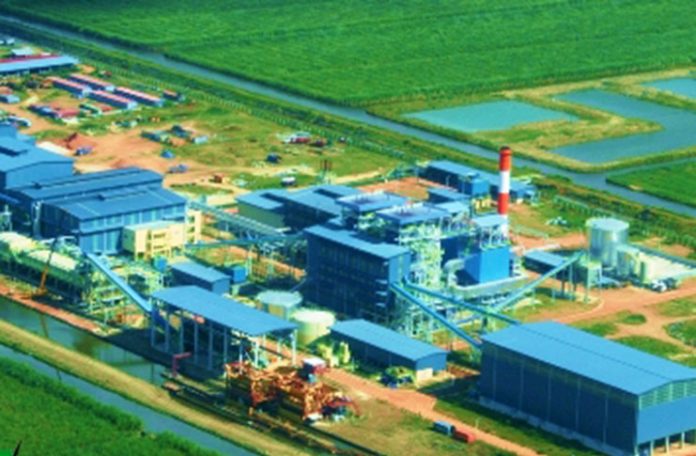The East Berbice Development Association (EBDA) has submitted an ambitious plan to the authorities to manage the Skeldon Sugar Factory
August 12, 2017 Source
— submits ambitious plan to manage sugar factory
THE East Berbice Development Association (EBDA) has submitted an ambitious plan to the authorities to manage the Skeldon Sugar Factory and proposes the cultivation of crops such as rice and beans to boost the income generating capacity of the State lands.
If the EDBA sees its way, the body will sell sugar and its by-products from the Skeldon factory here in Guyana and only the surpluses would be exported; the Caribbean Community (CARICOM) would buy the body’s primary market.
The EBDA, which was formed in 2009 with the aim of identifying areas of development of the East Berbice region, has submitted its proposal to the government via the Ministry of Agriculture.
In June, the Ministry forwarded the entity’s proposal to the government holding company, NICIL (National Industrial Commercial and Investment Limited), which points to the imminent divestment of the multi-million dollar factory.
In its plan for the Skeldon Estate, the association, which is chaired by David Subnauth, proposes a public/private arrangement in which it offers one million shares at US$100 each.
“The shareholders would comprise sugar workers, civil servants, members of the business community, the general public and the diaspora,” the group stated.
The association proposes a sectioned management structure which would include a “Cultivation Section,” which it said would operate like a private cane farm.
The group said the factory would operate as a separate entity, receiving payments similar to the current arrangement with the private cane farmers in which 1/3 sugar is produced for the factory and 2/3 for the farmers.
The association proposes that all agricultural machinery will be in a “machinery pool”, where each entity, as well as independent farmers or the public can hire from the pool, providing they are available.
On the other hand, it stated that the pool can hire from the farmers when the need arises.
It noted that there would be a machinery workshop, which would be a separate entity and the public can also utilise its services. It proposed a dispensary which will offer its services to the public at a cost and there would be a main office which would operate independently, providing services to all the various entities, including the public.
The security services would be another entity, providing services to the estate and the general public and there is also a plan for a guest house and other relevant departments which would be responsible for generating their independent revenue to cover all costs and produce a surplus.
LESS PROBLEMATIC
In terms of employees, the group proposes a pension fund and other workers welfare will be taken care of in the said prevailing manner. It said that labour relations would be less problematic since every worker would most likely be a shareholder.
According to the group, although figures submitted by the management of Skeldon Sugar Estate show that for 2015, which has been the best year of operations, the approximate loss of the estate was S2.5B.
“We still believe that with prudent management and new strategies we can eliminate the losses and see a profit,” the association stated.
It said that it proposes to separate the field from the factory, where the production of the field would be paid similar to the current arrangement with the private cane farmers. All the other sectors of the estate would operate independently to make surpluses.
In its plan, the association proposed crop rotation.
The body explained that when a field should be flood-fallowed after its sixth or seventh ratoon, rice would be planted so that the land can be under water for a long period.
“Beans can also be another one of our crops,” it said, adding that aquaculture is yet another option to obtain the benefits of flood fallow, while still using the land to generate more income.
To this end, the association stated that within two years of commencement, all the land under the control of the Skeldon Estate will be utilised.
“We anticipate that the factory would operate and maintain itself with the one-third share of annual production and income from other by-products of sugar/sugarcane, including co-generation,” the group proposed.
In addition, the association plans to look overseas in its proposed take-over. It said it would look at India, Brazil, and Australia, among other sugar producing countries, to investigate the various by-products of the sugar industry and once feasible, to connect the factory to implement production.
The association added that it will venture into value-added production such as packaging and refining. It noted that the marketing of sugar and other by-products would be done locally since the entire company would be owned and operated by Guyanese.
“The main intention of acquiring the estate is to secure local ownership, maintain and create additional employment for our citizens and to enhance the economy of this region and Guyana as a whole,” the association noted in its proposal.
The body has been engaging the government since February this year to acquire and manage the Skeldon Estate.
The US$200M factory was built by the former government with the aim of being the industry’s flagship and an intended production capacity of 450,000 tonnes.
However, since 2009 when it was opened, the factory has been beset by mechanical and other difficulties and production never met the intended dreams of the government of the day.

